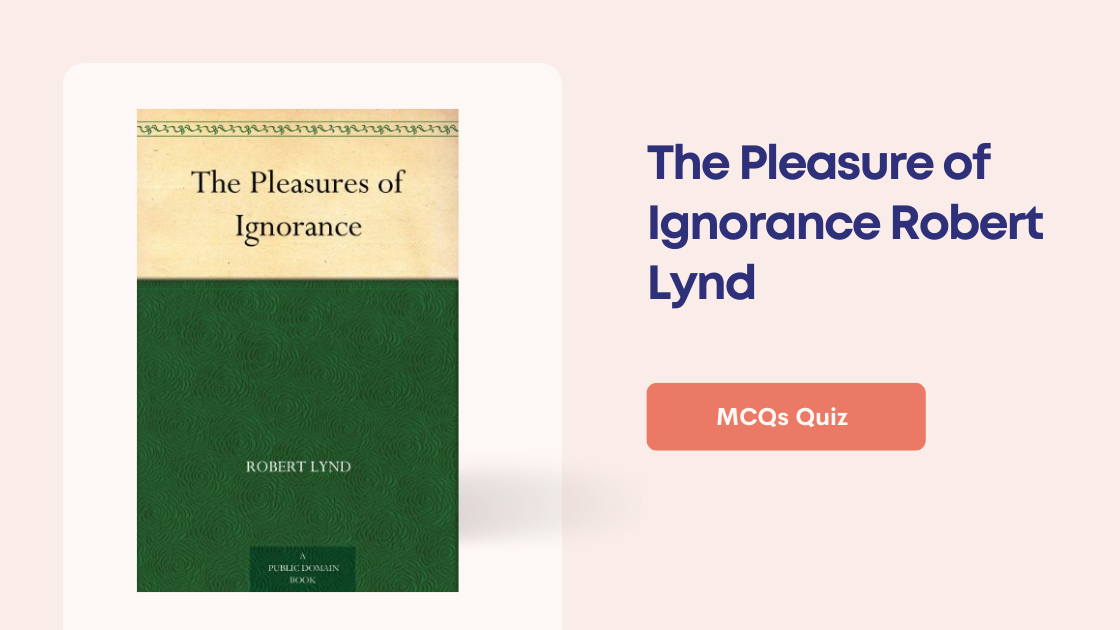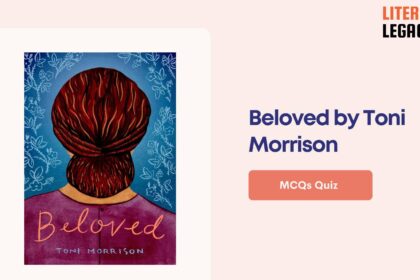Found it useful? Download your PDF copy of the MCQ Worksheet today at ₹10
1. What is Robert Lynd known for?
A. Being a popular essayist, critic, columnist, and poet
B. Being a legendary artist and sculptor
C. Being a famous novelist and playwright
D. Being a renowned scientist and mathematician
Answer: Being a popular essayist, critic, columnist, and poet (A)
Robert Lynd is known for being a popular essayist, critic, columnist, and poet.
2. In what magazine did Robert Lynd contribute his weekly literary essay under the pseudonym Y.Y.?
A. New Statesman
B. The Atlantic
C. National Geographic
D. Vogue
Answer: New Statesman (A)
Robert Lynd contributed his weekly literary essay to the New Statesman magazine under the pseudonym Y.Y.
3. What does Robert Lynd argue in ‘The Pleasures of Ignorance’?
A. Knowledge leads to the constant pleasure of discovery
B. Ignorance leads to the constant pleasure of discovery
C. Ignorance leads to stagnation
D. Knowledge leads to an unhappy life
Answer: Ignorance leads to the constant pleasure of discovery (B)
‘The Pleasures of Ignorance’ by Robert Lynd argues that out of ignorance, ‘we get the constant pleasure of discovery.’
4. Which season is especially mentioned as being amazing for a walk in the country?
A. April or May
B. December or January
C. August or September
D. June or July
Answer: April or May (A)
April or May is mentioned as being amazing for a walk in the country with an average townsman.
5. What is one example of people’s ignorance mentioned by Robert Lynd in his essay?
A. Not understanding the principles of physics
B. Not knowing the capital of France
C. Not being able to solve complex mathematical equations
D. Not knowing the difference between a beech and an elm tree
Answer: Not knowing the difference between a beech and an elm tree (D)
Robert Lynd mentions that thousands of people live and die without knowing the difference between a beech and an elm.
6. Why does Robert Lynd claim that many people cannot distinguish between bird songs?
A. Lack of hearing abilities
B. Not enough education on bird songs
C. Lack of observation and not noticing the birds around them
D. Too much noise pollution in cities
Answer: Lack of observation and not noticing the birds around them (C)
Robert Lynd suggests that many people cannot distinguish between bird songs not because they haven’t seen the birds, but because they have not noticed them due to feeble observation.
7. ‘The Pleasures of Ignorance’ implies that knowledge sometimes limits:
A. The sense of accomplishment.
B. The desire for learning.
C. The joy of discovery.
D. The ability to socialize.
Answer: The joy of discovery. (C)
According to Robert Lynd’s essay, ignorance can sometimes enhance the joy of discovery compared to having extensive knowledge.
8. What is one characteristic of Robert Lynd’s essays?
A. Humor and precise observations
B. Dark and pessimistic outlooks
C. Technical jargon and terminology
D. Complex mathematical formulas
Answer: Humor and precise observations (A)
Robert Lynd’s essays are characterized by humor, precise observations, and a lively, engaging style.
9. What did Robert Lynd use as his pseudonym when writing his literary essays?
A. Y.Y.
B. Z.Z.
C. A.A.
D. X.X.
Answer: Y.Y. (A)
Robert Lynd used the pseudonym Y.Y. when writing his weekly literary essays for the New Statesman magazine.
10. According to Robert Lynd, why do many people live and die without knowing about nature?
A. Due to their busy urban lifestyles
B. Due to their inability to access information about nature
C. Due to lack of interest in learning about nature
D. Due to lack of observation and noticing what’s around them
Answer: Due to lack of observation and noticing what’s around them (D)
Robert Lynd indicates that many people live and die without knowing about nature because they lack observation skills and do not notice what’s around them.
11. What precedes the fruit of an apple tree, according to the text?
A. Blossom precedes fruit
B. Fruit and blossom occur simultaneously
C. Fruit and blossom appear at different times of the year
D. Fruit precedes blossom
Answer: Blossom precedes fruit (A)
The text mentions that the blossom precedes the fruit of the apple tree.
12. How does the author describe their memory?
A. Excellent and precise
B. Forgetful and capricious
C. Selective and vast
D. Sharp and focused
Answer: Forgetful and capricious (B)
The author describes having a capricious and leaking memory in the text.
13. What does the author compare re-learning the names of flowers every spring to?
A. Exploring a new garden
B. Discovering a new book
C. Re-reading a forgotten book
D. Attending a special event
Answer: Re-reading a forgotten book (C)
The comparison made in the text is between re-learning flower names in spring to re-reading a book that one has almost forgotten.
14. Why does the author suggest there may be as much to be said for a bad memory as for a good one?
A. A bad memory allows for endless reading and learning
B. A bad memory prevents forgetfulness
C. A bad memory retains only major details
D. A bad memory is easier to manage
Answer: A bad memory allows for endless reading and learning (A)
The text discusses how having a bad memory can allow for continuously reading books like Plutarch and The Arabian Nights without getting tired of them.
15. What does the author imply about forgetting information from books and life?
A. It indicates poor intellectual ability
B. It is unnecessary for personal growth
C. It leads to confusion and misunderstanding
D. It allows one to experience things anew
Answer: It allows one to experience things anew (D)
The text suggests that forgetting information from books and life enables seeing the world with fresh eyes, akin to experiencing things anew.
16. What is the most important crop in England according to the contemporary English novelist mentioned in the text?
A. Wheat
B. Barley
C. Maize
D. Rye
Answer: Rye (D)
The contemporary English novelist answered ‘Rye’ when asked about the most important crop in England, showcasing ignorance.
17. ‘One of the greatest joys known to man is to take such a flight into ignorance in search of knowledge.’ What is meant by this statement?
A. The joy of avoiding knowledge
B. The joy of asking questions to overcome ignorance
C. The joy of having all answers without asking questions
D. The joy of staying ignorant forever
Answer: The joy of asking questions to overcome ignorance (B)
The statement implies that joy comes from asking questions to seek knowledge even when starting from a point of ignorance.
18. ‘Knowledge outside the day’s work is regarded by most men as a gewgaw.’ What does ‘gewgaw’ mean in this context?
A. ‘Gewgaw’ refers to essential knowledge
B. ‘Gewgaw’ refers to universal truths
C. ‘Gewgaw’ refers to trivial or showy knowledge
D. ‘Gewgaw’ refers to valuable wisdom
Answer: ‘Gewgaw’ refers to trivial or showy knowledge (C)
‘Gewgaw’ in this context means trivial or showy knowledge that is often disregarded by many.
19. ‘The man who has lost this pleasure or exchanged it for the pleasure of dogma…is already beginning to stiffen.’ What does ‘stiffen’ imply in this sentence?
A. ‘Stiffen’ means becoming more flexible
B. ‘Stiffen’ means becoming resistant to change
C. ‘Stiffen’ means becoming open-minded
D. ‘Stiffen’ means becoming more relaxed
Answer: ‘Stiffen’ means becoming resistant to change (B)
‘Stiffen’ in this sentence suggests becoming resistant to change or ideas due to being rigid in beliefs.
20. What is the author’s opinion on ignorance as described in the text?
A. Ignorance is blissful but ultimately hinders intellectual growth.
B. Ignorance is beneficial as it allows for constant discovery and pleasure.
C. Ignorance is considered miserable and should be avoided at all costs.
D. Ignorance is dangerous and can lead to misunderstandings about nature.
Answer: Ignorance is beneficial as it allows for constant discovery and pleasure. (B)
The author views ignorance positively, highlighting its role in bringing constant pleasure through discovery.
21. What does the author suggest about the pleasure of observing nature for the naturalist as compared to a novice?
A. The naturalist’s pleasure is more enthusiastic and transient compared to the novice.
B. The pleasure of observing nature is not described in the text.
C. The naturalist finds no pleasure in observing nature.
D. Both the naturalist and novice experience steady and sober pleasure.
Answer: The naturalist’s pleasure is more enthusiastic and transient compared to the novice. (A)
The text contrasts the steady pleasure of the naturalist with the morning enthusiasm of a novice seeing something like a cuckoo for the first time.
22. Why does the author mention the naturalist’s desire to see the female cuckoo laying her egg?
A. To show that naturalists are overly obsessed with cuckoos.
B. To highlight the importance of firsthand observation and confirmation.
C. To contrast the views of naturalists and novices.
D. To emphasize the danger of the cuckoo’s breeding habits.
Answer: To highlight the importance of firsthand observation and confirmation. (B)
The author mentions this to stress how naturalists seek confirmation through personal observation, highlighting the value of firsthand experiences.
23. How does the author describe the new moon’s appearance according to the text?
A. It always appears on a different day of the week.
B. It never appears as a pleasant surprise to those familiar with its time-tables.
C. Its appearance is dreaded by those who know its schedule.
D. Its appearance is always a pleasant surprise even to those who know when to expect it.
E. Its appearance is predictable and can be foreseen by everyone.
Answer: Its appearance is always a pleasant surprise even to those who know when to expect it. (D)
The text suggests that even those familiar with the new moon’s schedule are pleasantly surprised by its appearance, implying that it always comes as a surprise.
24. What does the author imply about knowledge and ignorance in relation to naturalists?
A. Naturalists’ knowledge surpasses that of all other professions.
B. The fortune of ignorance continues to drive naturalists to discover new aspects of nature.
C. Naturalists have no reason to pursue knowledge further due to their extensive understanding.
D. Naturalists should focus solely on theoretical knowledge rather than practical observation.
E. Ignorance is more valuable than knowledge for naturalists.
Answer: The fortune of ignorance continues to drive naturalists to discover new aspects of nature. (B)
The author suggests that despite naturalists’ significant knowledge, their pursuit continues due to the vast opportunities for discovery stemming from ignorance.
25. In what way does the author describe the pleasure derived from finding an early primrose?
A. It is deemed unsatisfactory if found out of season.
B. It is not a pleasurable experience according to the text.
C. It is described as less enjoyable due to its early appearance.
D. It is considered mundane and predictable.
E. It is likened to a thrilling experience similar to finding a hidden treasure.
Answer: It is likened to a thrilling experience similar to finding a hidden treasure. (E)
The author likens finding an early primrose to a delightful experience akin to discovering a hidden treasure, emphasizing the joy derived from such encounters.
26. What emotion does the author associate with witnessing a cuckoo’s flight for the first time?
A. Enthusiasm
B. Sadness
C. Confusion
D. Fear
E. Indifference
Answer: Enthusiasm (A)
The author describes the experience of witnessing a cuckoo’s flight for the first time as one filled with morning enthusiasm, indicating a sense of excitement or eagerness.
27. Why do naturalists feel half ignorant even after reaching ‘the very Z of knowledge in the books’?
A. To encourage them to pursue more conventional learning methods
B. Due to their lack of interest in practical observations
C. To discourage them from seeking further knowledge
D. Because they have not read enough books on ornithology
E. Because confirmation through personal observation is essential for full understanding
Answer: Because confirmation through personal observation is essential for full understanding (E)
The text implies that naturalists feel partially ignorant until they confirm their knowledge with personal observations, underscoring the value of firsthand verification.
28. How does the author describe the pleasure derived from observing nature for a novice compared to that for a naturalist?
A. Observing nature does not bring any pleasure according to the text
B. The novice experiences sober and plodding pleasure compared to the naturalist’s excitement
C. The naturalist’s pleasure is transient compared to the steady pleasure of a novice
D. Both derive similar levels of pleasure from observing nature
Answer: The naturalist’s pleasure is transient compared to the steady pleasure of a novice (C)
The text contrasts the steady, almost sober pleasure of the naturalist with the morning enthusiasm experienced by novices when observing nature.
29. What does the author suggest about ignorance in relation to discovering new aspects of nature?
A. Ignorance has no role in the process of exploring nature
B. Ignorance hinders any possibility of discovering new elements in nature
C. Ignorance enables individuals to uncover constant pleasures through discovery in nature
D. Ignorance causes individuals to misunderstand nature completely
Answer: Ignorance enables individuals to uncover constant pleasures through discovery in nature (C)
The author highlights that ignorance plays a positive role in enabling individuals to continuously discover new aspects and pleasures within nature.



